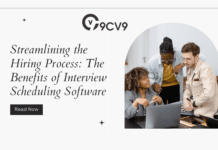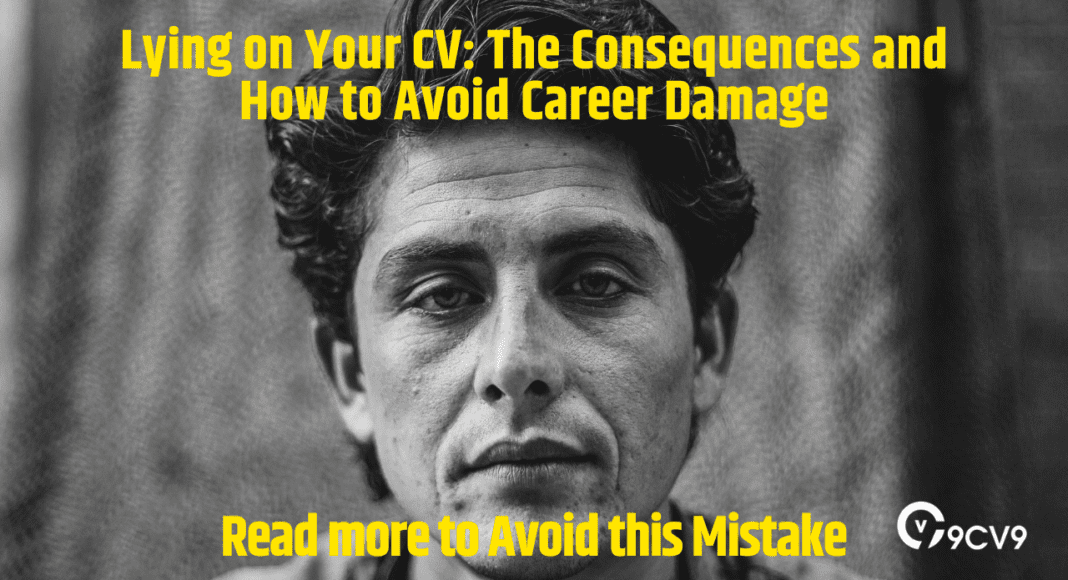Key Takeaways
- Lying on your CV can have serious consequences, including losing your job and damaging your reputation.
- Employers have various methods of detecting lies on CVs, including background checks, reference checks, and skills testing.
- To avoid career damage, it’s important to focus on honesty, accuracy, and professionalism when crafting your CV, and seek professional advice if needed.
Honesty is the Best Policy
– Sir Edwin Sandys, Virginia Company
Are you thinking about embellishing your CV with some ‘white lies’ to make yourself stand out from the competition?
Think again.
Lying on your CV can have serious consequences that can damage your career in the long run.
Not only can it lead to a loss of credibility and trust, but it can also result in losing your job, being blacklisted in your industry, and even facing legal repercussions.
In today’s hyper-competitive job market, it’s understandable that job seekers may feel tempted to embellish their qualifications or achievements to get ahead.
According to a survey by CareerBuilder, 75% of HR managers spot inaccuracies in resumes. That is like 3 out of every 4 CVs screened, a high and damning statistic.
But the truth (no pun intended) is that honesty is always the best policy when it comes to crafting your CV.
In this blog post, we’ll explore the common lies that job seekers put on their CVs, the potential consequences of lying on a CV, and most importantly, how to avoid the temptation to lie in the first place.
Whether you’re a recent graduate just entering the job market, or a seasoned professional looking to take your career to the next level, this post will provide you with valuable insights on how to create a CV that accurately reflects your skills, experience, and achievements.
We’ll also discuss how employers detect lies on CVs, and provide you with practical tips on how to ensure that your CV passes scrutiny.
So if you’re ready to learn about the importance of honesty on your CV, and how to avoid the potential career damage that can result from lying, keep reading.
Before we venture further into this article, we like to share who we are and what we do.
About 9cv9
9cv9 is a business tech startup based in Singapore and Vietnam with a strong presence all over the world.
With over six years of startup and business experience, and being highly involved in connecting with thousands of companies and startups, the 9cv9 team has listed some important learning points in this overview of why you should not lie on your CV.
If you are looking for a job and have an honest CV, we welcome you to apply for a job at 9cv9 now.
Lying on Your CV: The Consequences and How to Avoid Career Damage
- Common Lies on CVs
- Consequences of Lying on Your CV
- How to Avoid Lying on Your CV
- How Employers Detect Lies on CVs
1. Common Lies on CVs

Some bluffs are easily called out.
Lies on the CV can be spotted easily.
Here are some examples from sources.
- One applicant said he worked for Microsoft but had never heard of Bill Gates.
- Another said he’d studied under the philosopher Nietzsche, who died in 1900.
- One man claimed he was a CIA anti-terrorist spy during the years he was in elementary school.
Here are some of the most common lies job seekers put on their CVs:
- Education: Exaggerating educational qualifications is one of the most common lies on CVs. This includes claiming to have completed a degree or diploma that you have not earned, or inflating your academic achievements. According to employers surveyed, 33% of the lies caught belonged to academic degrees.
- Work experience: Another common lie on CVs is exaggerating work experience. This can include claiming to have worked for longer than you actually have, inflating job titles, or taking credit for accomplishments that you did not achieve. According to employers surveyed, 26% of the lies caught belonged to companies the applicants worked for.
- Skills: Some job seekers may also exaggerate their skills or claim to have skills that they do not possess. This can include language proficiency, computer skills, or technical skills. According to employers surveyed, 57% of the lies caught belonged to embellished skill sets.
- Salary: Some job seekers may inflate their previous salary to negotiate a higher salary for their next job.
- References: Falsifying references is another common lie on CVs. This can include claiming to have worked with people who do not exist or who you have not actually worked with.
These lies can be tempting to include on your CV, but they can have serious consequences that can damage your career in the long run.
In the next section, we’ll discuss the potential consequences of lying on your CV.
2. Consequences of Lying on Your CV

Lying on your CV may seem like a harmless way to boost your chances of getting hired, but it can have serious consequences that can harm your career in the long run.
Here are some potential consequences of lying on your CV:
- Loss of credibility: Lying on your CV can lead to a loss of credibility with your current or potential employer. Once your employer discovers that you have lied on your CV, they may view you as untrustworthy and dishonest, making it difficult for you to advance in your career.
- Instant application failure: According to CareerBuilder, 51% of the recruiters said that they would automatically dismiss a candidate if they caught a lie on his/her resume.
- Termination: If your employer discovers that you have lied on your CV after you have been hired, they may terminate your employment immediately. This can be embarrassing and can harm your chances of getting hired in the future.
- Blacklisting: If you are caught lying on your CV, your reputation can be damaged, and you may be blacklisted in your industry. This can make it difficult for you to find work in the future, as your dishonesty will be known to other employers.
- Legal repercussions: In some cases, lying on your CV can result in legal repercussions. As that constitutes misrepresentation and in some cases, fraud, you might be tied in the local courts for breaking the law. For example, if you lie about your educational qualifications and are hired for a job that requires those qualifications, you could be sued for fraud. Basically, if a qualification is required to legally carry out a job, legal action can be taken against you. In Vietnam, for example, it is a criminal offense under the Penal Code to submit false documents to another party.
- Damage to the company: Lying on your CV can also harm the company that you work for. If your employer discovers that you have lied on your CV, it can damage their reputation and lead to legal problems.
In summary, lying on your CV can have serious consequences that can damage your career in the long run. It’s always better to be honest and showcase your real skills and achievements, even if it means that you don’t get hired for a particular job. In the next section, we’ll discuss how to avoid the temptation to lie on your CV.
3. How to Avoid Lying on Your CV

Avoiding the temptation to lie on your CV can be challenging, especially if you feel that you need to compete with other job seekers who may be more qualified.
Well, we are not going to lie (pun intended) to you. We have some tips and tools below to help you avoid lying on your CV.
However, it’s important to remember that lying on your CV can have serious consequences that can damage your career in the long run. Here are some tips on how to avoid lying on your CV:
- Use a modern and verified CV builder: UrbanCV, the world’s 1st modern and high-tech CV builder has helped thousands of job seekers build verified and proper CVs. Best of all, it’s free.
- Be honest: The best way to avoid lying on your CV is, to be honest about your skills, experience, and qualifications. Focus on highlighting your actual achievements and strengths, rather than trying to embellish or exaggerate them.
- Don’t oversell yourself: While it’s important to showcase your strengths and achievements, it’s equally important not to oversell yourself. Be realistic about your abilities and accomplishments, and avoid making claims that you cannot back up with evidence.
- Do an internship or a side gig to boost your CV: Inevitably, you might fall short of some requirements needed for the job application but hey, there is no need to be dishonest to “fake” boost your CV. Work for it. Do an internship or a side gig, or a freelance job to obtain those requirements needed for the job you are applying for.
- Verify your claims: Before you include any claims on your CV, make sure that you can back them up with evidence. For example, if you claim to have a certain qualification, make sure that you can provide a copy of your certificate.
- Use accurate job titles: When describing your work experience, use accurate job titles that reflect your actual role and responsibilities. Avoid inflating your job title, as this can be misleading and can harm your credibility.
- Don’t falsify references: Avoid falsifying references on your CV, as this can be easily detected and can harm your credibility. Instead, provide references that can vouch for your skills and experience.
- Seek professional advice: If you’re not sure how to showcase your skills and experience on your CV, seek professional advice from a career coach such as 9cv9, or a resume writer. They can provide you with valuable insights on how to create a strong and honest CV that accurately reflects your skills and experience.
By following these tips, you can avoid the temptation to lie on your CV and create a strong and honest CV that accurately reflects your skills and achievements. Remember, honesty is always the best policy when it comes to crafting your CV and can help you build a successful and fulfilling career in the long run.
4. How Employers Detect Lies on CVs

Employers have various methods of detecting lies on CVs, and these methods are becoming increasingly sophisticated with advances in technology.
Here are some common ways that employers detect lies on CVs:
- Background checks: Many employers conduct background checks to verify the information provided on a CV. These checks can include employment history, educational qualifications, and criminal records. If there are any discrepancies or inconsistencies in the information provided on the CV and what is discovered during the background check, it can be a red flag for the employer.
- Reference checks: Employers may contact the references provided on a CV to verify the information provided. If the references cannot verify the claims made on the CV or provide conflicting information, this can be a sign of dishonesty.
- Skills testing: Some employers may require candidates to take skills tests to verify their abilities in specific areas. If the candidate cannot perform as claimed on their CV, it can indicate dishonesty.
- Social media screening: Employers may also check candidates’ social media profiles to gather additional information about them. If the information on the candidate’s social media profile conflicts with the information on their CV, it can be a sign of dishonesty.
- Inconsistencies in the CV: Employers may also detect lies on a CV by looking for inconsistencies in the information provided. For example, if the dates of employment do not match up or the candidate claims to have worked at a company that does not exist, it can indicate dishonesty.
- Interview: Interviews are useful for many reasons and one of which is to audit and ascertain the claims written by the applicant in his/her CV. For example, if the applicant wrote in his/her CV that he/she has worked for Microsoft but had never heard of Bill Gates, then it is quite likely the applicant is lying.
In summary, employers have various methods of detecting lies on CVs, and it’s becoming increasingly difficult to get away with dishonesty.
It’s always better, to be honest on your CV and highlight your actual skills and experience rather than risk damaging your reputation and career in the long run.
Once again, as Sir Edwin of the Virginia Company once said, “Honesty is the Best Policy”.
Conclusion
Lying on your CV can have serious consequences that can damage your career in the long run.
While it may be tempting to embellish your qualifications or achievements to stand out from other job seekers, it’s important to remember that honesty is always the best policy when it comes to crafting your CV.
The consequences of lying on your CV can be severe, including losing your job, damaging your reputation, and even facing legal action.
Therefore, it’s essential to avoid the temptation to lie and focus on showcasing your actual skills and experience.
By following the tips outlined in this article, you can avoid the temptation to lie on your CV and create a strong and honest CV that accurately reflects your skills and achievements.
Remember to be honest, avoid overselling yourself, and verify your claims with evidence.
It’s also important to seek professional advice if you’re unsure how to create a strong CV that accurately reflects your skills and experience.
A career coach or resume writer can provide you with valuable insights and guidance on how to create a compelling CV that will help you land your dream job.
More often than not, jobseekers use UrbanCV’s templates to help them create a CV quickly and one that adheres to most organizations’ CV standards.
In summary, lying on your CV can have serious consequences that can damage your career in the long run.
By focusing on honesty, accuracy, and professionalism, you can create a strong and compelling CV that accurately reflects your skills and experience, and avoid career damage.
If you find this article useful, why not share it with your family and friends and also leave a nice comment below?
We, at the 9cv9 Research Team, strive to bring the latest and most meaningful data, guides, and statistics to your doorstep.
People Also Ask
What are examples of lying on a CV?
Examples of lying on a CV include exaggerating job titles or responsibilities, fabricating employment or education history, falsifying references or recommendations, and claiming false or inflated qualifications or certifications. Other common lies include concealing gaps in employment, lying about language proficiency or computer skills, and inflating salary history. Lying on a CV can have serious consequences and is never worth the risk. Employers have various methods of detecting lies, so it’s important, to be honest, and accurate when crafting your CV.
Why is it important to be honest in your CV?
Being honest on your CV is crucial for several reasons. Firstly, lying on your CV can lead to serious consequences, including losing your job and damaging your reputation. Secondly, employers have various methods of detecting lies, so it’s not worth the risk. Thirdly, honesty builds trust and credibility with your potential employer, which is crucial for a successful career. Finally, an honest CV accurately reflects your skills and experience, ensuring you are considered for the right job opportunities.
What is the definition of lying on a resume?
Lying on a resume refers to the act of intentionally providing false or misleading information on a job application. This can include exaggerating job titles or responsibilities, fabricating employment or education history, falsifying references or recommendations, and claiming false or inflated qualifications or certifications. Lying on a resume can have serious consequences, including losing your job and damaging your reputation, and it’s never worth the risk.
What happens if you lie about your GPA on a resume?
Lying about your GPA on a resume can have serious consequences. If an employer discovers that you have provided false information, it can result in immediate dismissal or even legal action. Additionally, lying about your GPA can damage your reputation and credibility, making it difficult to secure future job opportunities. It’s always best to be honest on your resume and focus on highlighting your skills and experience in a truthful and accurate manner.































![Writing A Good CV [6 Tips To Improve Your CV] 6 Tips To Improve Your CV](https://blog.9cv9.com/wp-content/uploads/2020/06/2020-06-02-2-100x70.png)


